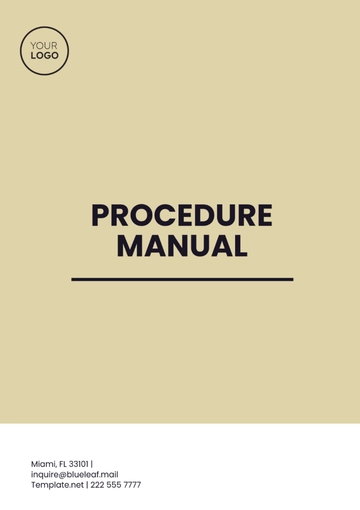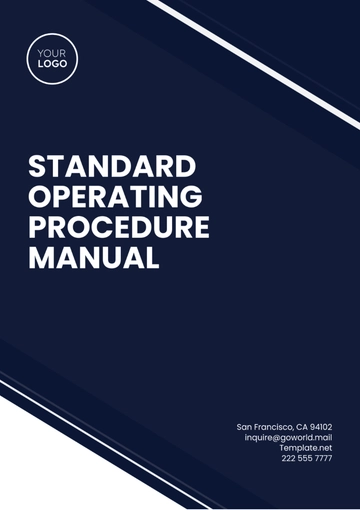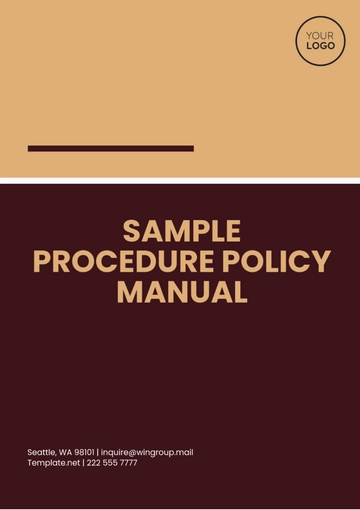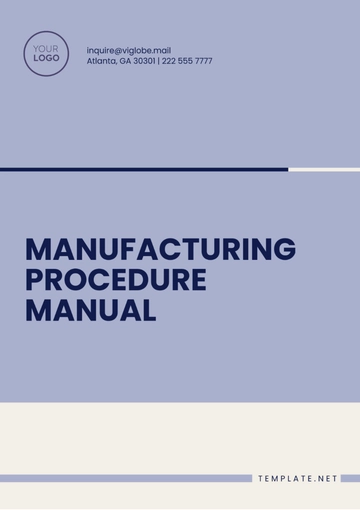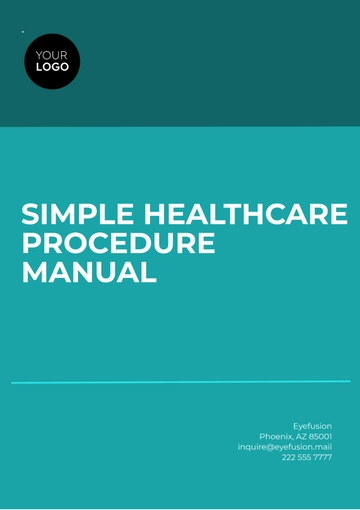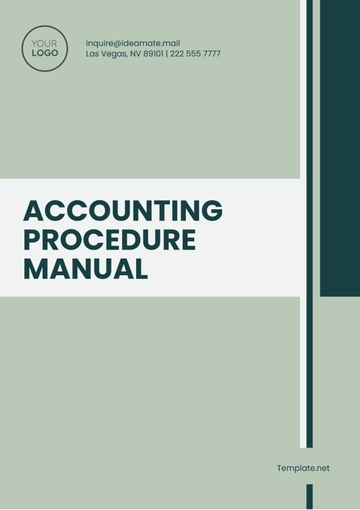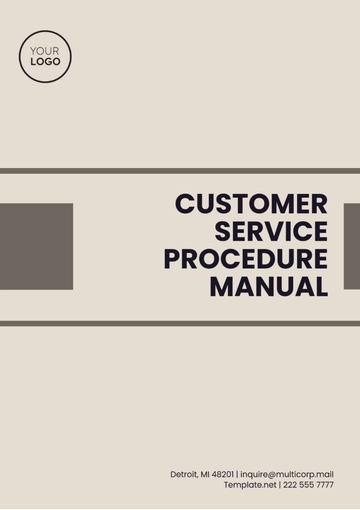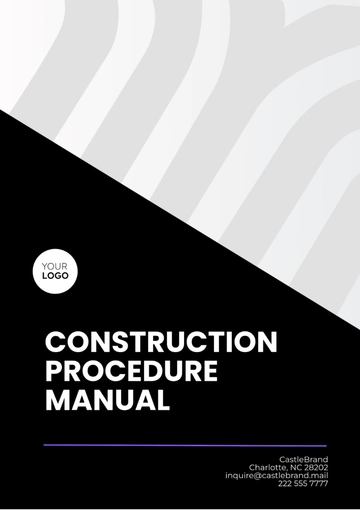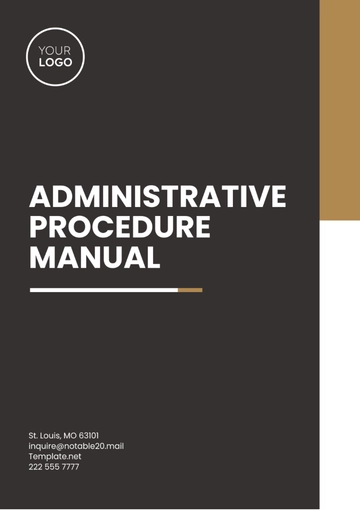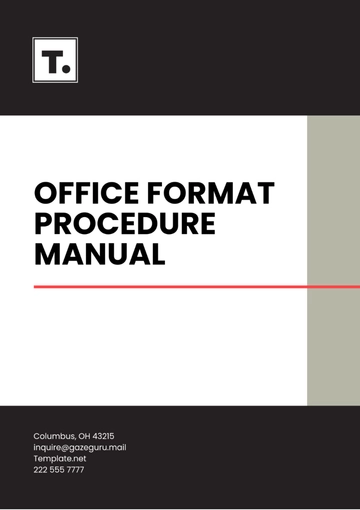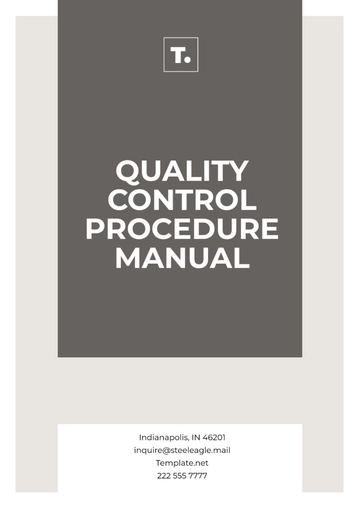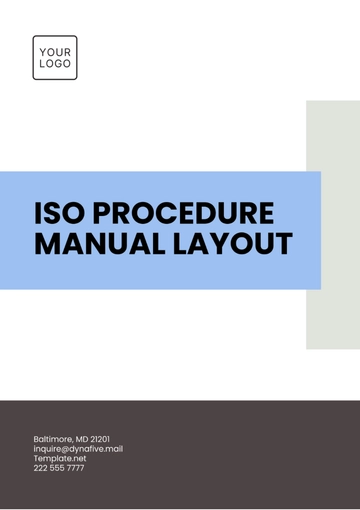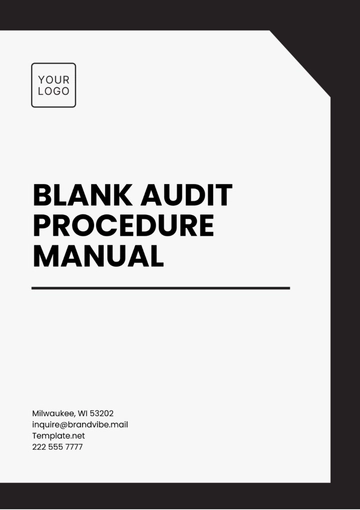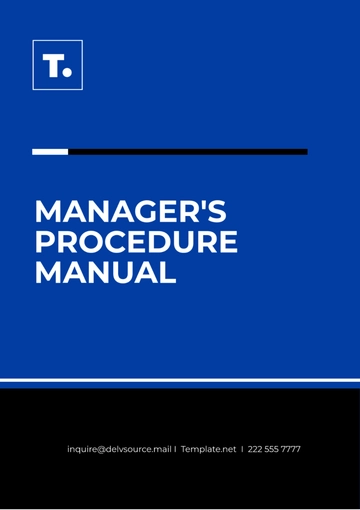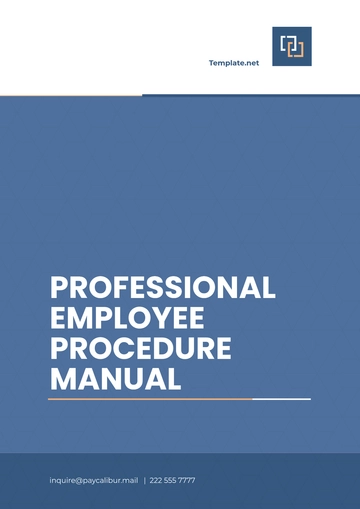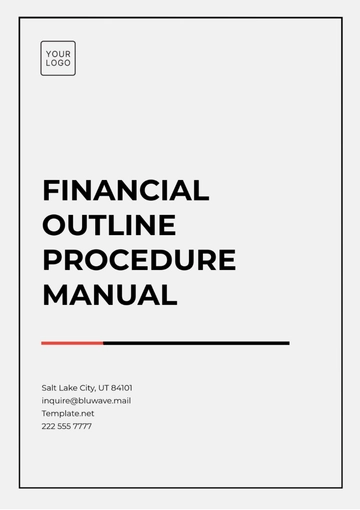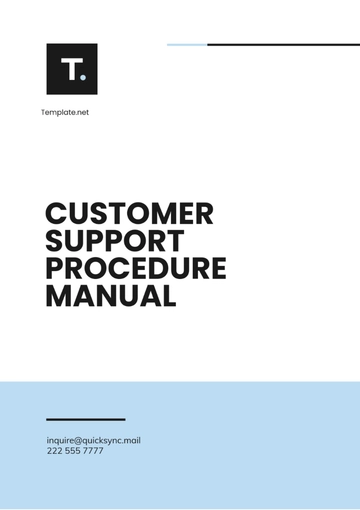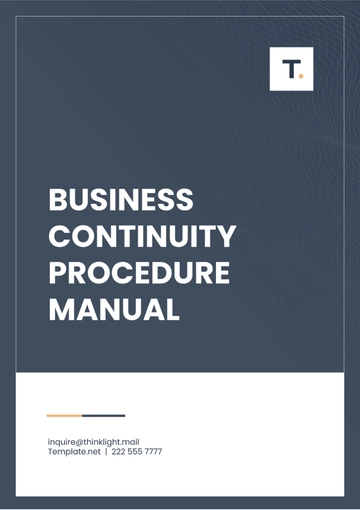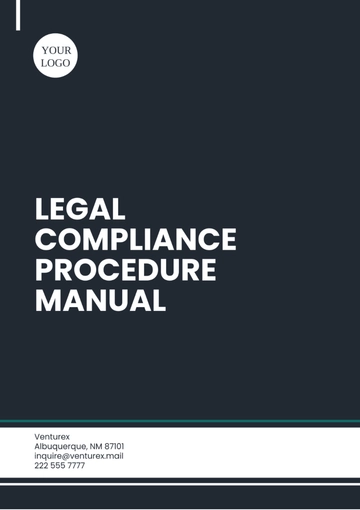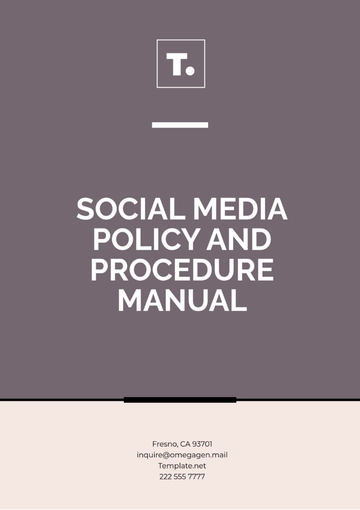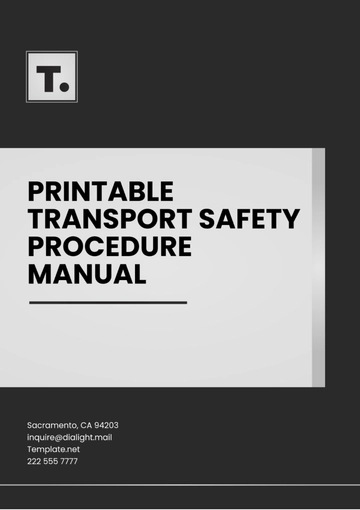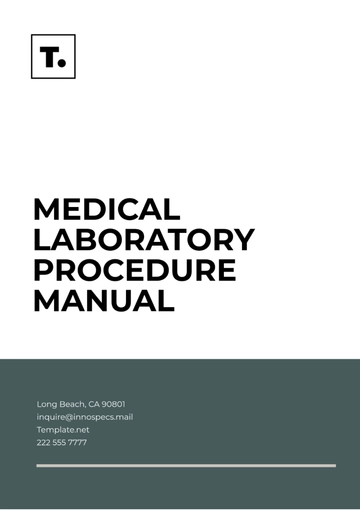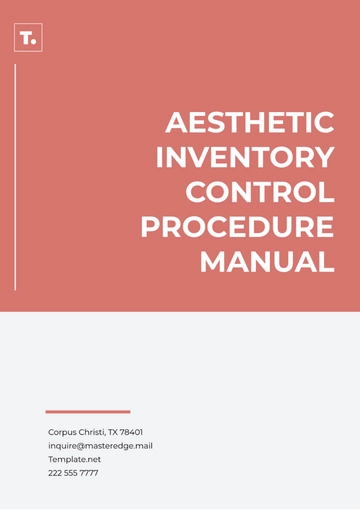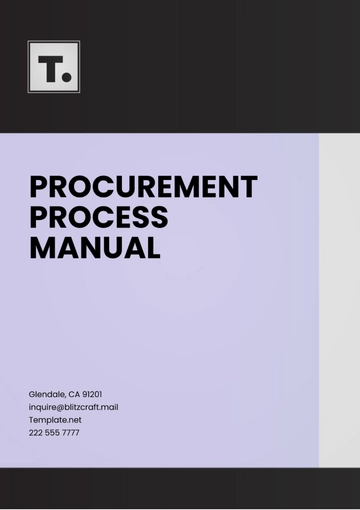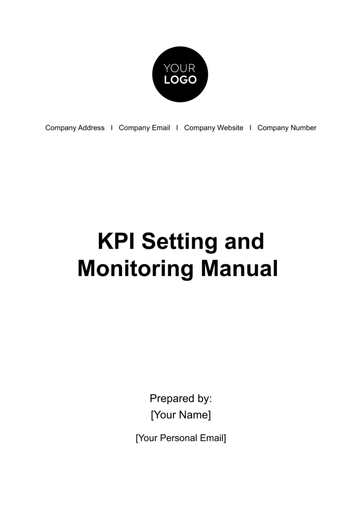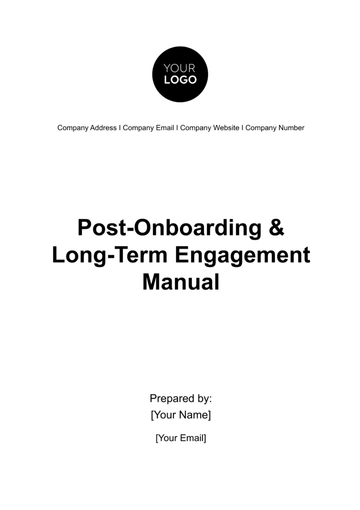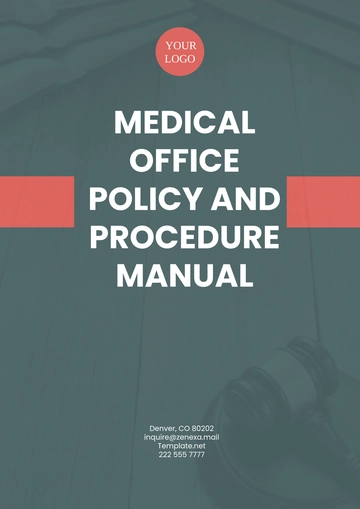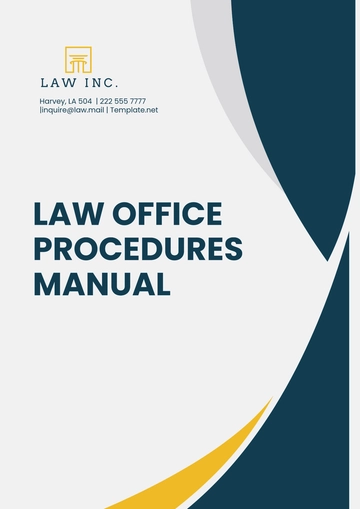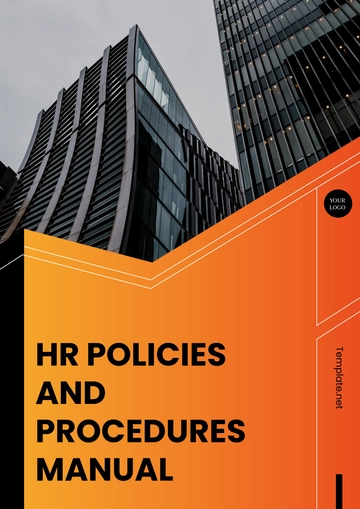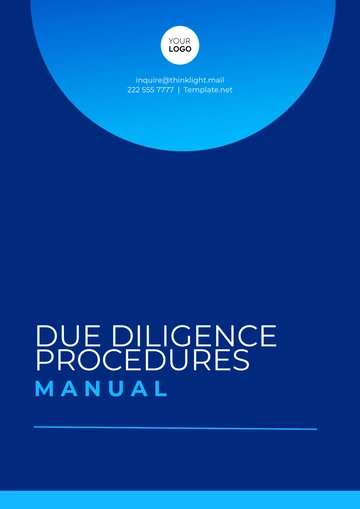Free Catering Manual
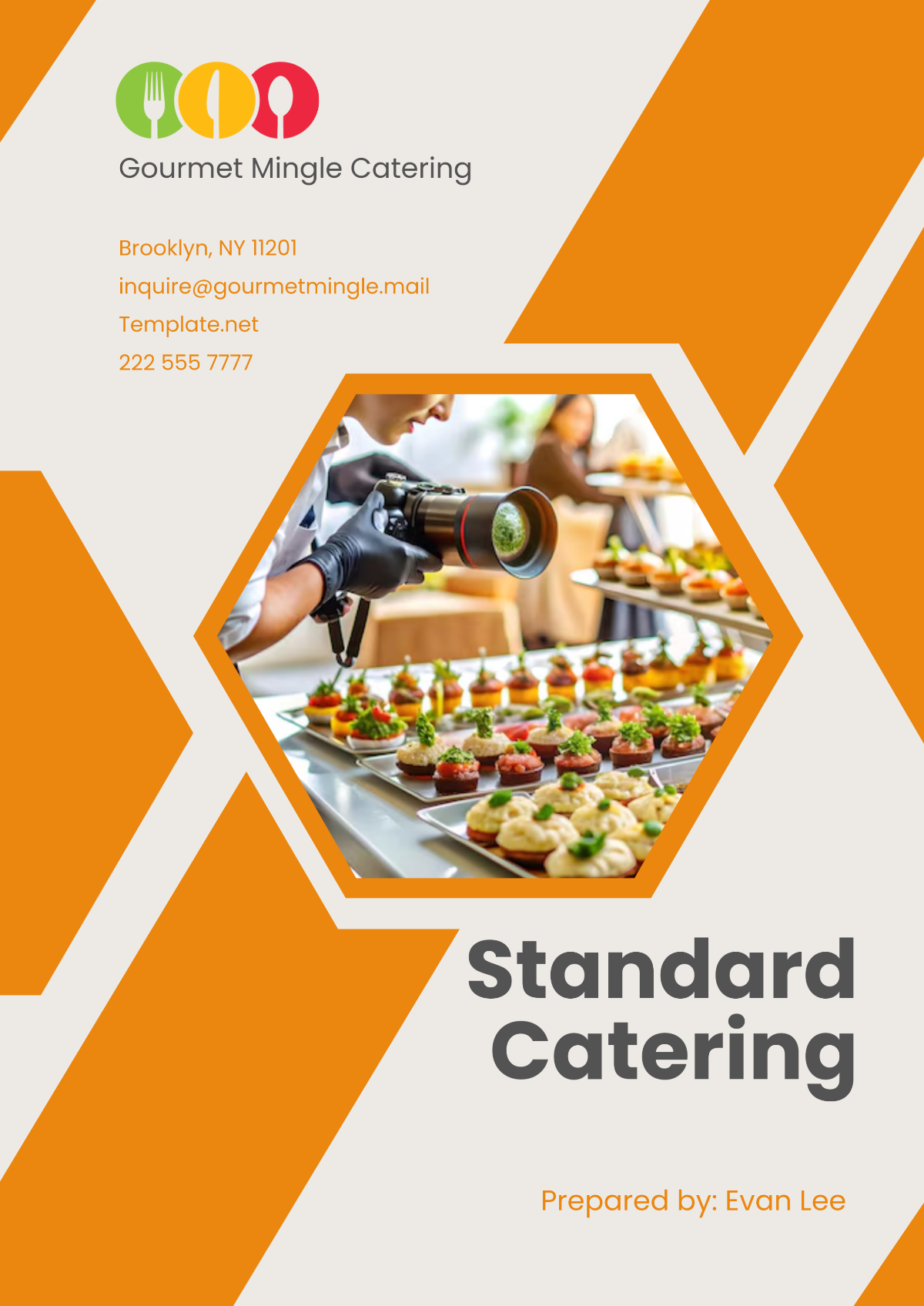
I. Introduction
A. Purpose
The purpose of this Catering Manual is to provide a comprehensive guide to ensure the smooth operation of all catering services offered by [Your Company Name]. Catering is a dynamic and multifaceted business that requires precision, creativity, and dedication. This manual outlines the key policies, standards, and best practices that will enable our team to deliver exceptional service. Every staff member is expected to familiarize themselves with this manual, which serves as a foundation for maintaining quality, consistency, and compliance across all operations.
Whether you are a new team member or a seasoned professional, this guide will provide you with the essential tools to navigate through the various aspects of the catering business. From understanding client needs to organizing seamless events, every section of this manual is designed to foster excellence. By adhering to the practices laid out here, [Your Company Name] will continue to uphold its reputation as a trusted, reliable, and innovative caterer.
B. Scope
The scope of this manual extends across all areas of [Your Company Name]'s catering services. It applies to all employees involved in the catering process, from event coordinators and kitchen staff to servers and delivery personnel. The manual covers the end-to-end process, starting from client consultation and menu planning to post-event reviews and feedback collection. It is a comprehensive document designed to ensure that every function, large or small, runs smoothly and leaves a lasting positive impression on our clients.
Additionally, this manual serves as a guide for ongoing improvements. As the catering industry evolves, so too will our practices. We recognize that client needs, dietary preferences, and event trends are constantly shifting, and we are committed to adapting to these changes. Therefore, this manual is subject to periodic updates to reflect new industry standards, innovations in service, and the latest health and safety regulations.
C. Mission Statement
At [Your Company Name], our mission is to create unforgettable culinary experiences that not only satisfy but delight our clients and their guests. We believe that food is central to every event and that it has the power to bring people together in celebration, collaboration, or community. Through our commitment to high-quality ingredients, meticulous preparation, and outstanding service, we aim to elevate every occasion, from intimate gatherings to large-scale corporate functions.
Our dedication to excellence is not limited to the kitchen; it extends to every interaction with our clients and guests. We strive to be a catering company that is known for its professionalism, reliability, and creativity. Every event we cater is an opportunity to showcase our expertise and passion for exceptional food and service.
II. Catering Services Overview
A. Types of Catering Services
1. Corporate Catering
Corporate catering is a critical component of [Your Company Name]'s services. It caters to the specific needs of businesses, where efficiency, professionalism, and timeliness are paramount. Corporate events often serve as platforms for networking, team building, or celebrating milestones, and the food provided plays a central role in the overall success of these events.
Our corporate catering services can be adapted to a variety of formats, including boardroom breakfasts, working lunches, and evening cocktail receptions. For formal dinners, we offer plated meals with sophisticated presentations, while casual meetings may benefit from buffet-style service or boxed lunches that are both convenient and delicious. Customization is key in corporate catering, and we work closely with clients to ensure that the menu reflects their preferences and organizational culture.
In addition to the meal itself, corporate catering often involves beverage service, including coffee stations, tea bars, and customized cocktail menus for after-hours events. Our professional staff ensures that all corporate events run seamlessly, allowing clients to focus on their business while we handle the logistics of food and beverage service.
2. Social Event Catering
Social events, such as birthdays, graduations, anniversaries, and holiday parties, provide a more relaxed and informal atmosphere, allowing us to showcase our creativity and adaptability. These events often require a personalized touch, where the menu is tailored to reflect the host's personality, preferences, and the event's theme. Whether it's a barbecue for a family reunion or a formal sit-down dinner for a 50th anniversary, [Your Company Name] takes pride in crafting memorable experiences.
Social event catering often emphasizes variety and flexibility. Buffets, food stations, and passed hors d'oeuvres are popular choices, allowing guests to mingle and sample a wide range of dishes. For more intimate gatherings, we may suggest family-style service, where large platters of food are shared among guests, fostering a communal dining experience.
Additionally, we recognize that every social event is unique, which is why we offer customizable decor, table settings, and presentation styles. Whether the client desires a rustic, chic, or modern aesthetic, we can adapt our services to meet their vision. Our goal is to enhance the event's atmosphere through thoughtful food presentation and attentive service.
3. Wedding Catering
Wedding catering is one of the most intricate and detail-oriented services we provide. Weddings are deeply personal, and every couple has a unique vision for their special day. At [Your Company Name], we collaborate closely with couples to bring their dream wedding to life, ensuring that the catering reflects their tastes, traditions, and cultural backgrounds.
Weddings often involve multiple courses, starting with cocktail hour, where guests can enjoy an array of passed appetizers or food stations. Dinner can range from elegant plated meals to elaborate buffets, depending on the couple's preferences. Dessert is often a highlight, with options ranging from traditional wedding cakes to dessert bars featuring cupcakes, macarons, and custom confections.
In addition to the food, our wedding catering services include beverage packages that can be tailored to the couple's needs. We offer full bar service, wine pairings, and signature cocktails that match the wedding theme. Our team understands the importance of flawless execution on such a significant day, and we work diligently to ensure that every detail, from the timing of courses to the decor of the tables, is perfect.
B. Menu Planning
1. Seasonal Menu Options
Menu planning is one of the core components of our catering services. At [Your Company Name], we place a strong emphasis on seasonal menus, as they allow us to use the freshest ingredients available. Seasonal dishes not only enhance flavor but also support sustainability by reducing the need for out-of-season imports.
Our chefs design menus that change with the seasons, ensuring variety and excitement for our clients. In the spring, lighter dishes featuring fresh vegetables, salads, and herbs are prominent. Summer menus focus on barbecues, grilled meats, and refreshing fruit-based desserts. Fall brings hearty comfort foods like roasted meats, root vegetables, and warm soups, while winter menus offer rich, indulgent options like braised meats, stews, and decadent desserts.
By rotating our menus according to the seasons, we provide clients with an ever-evolving array of choices that reflect the best ingredients available at any given time. Seasonal menu planning also allows us to showcase regional flavors and support local farmers, further emphasizing our commitment to sustainability.
2. Dietary Restrictions
With increasing awareness of dietary restrictions and food allergies, it is essential for us to provide diverse menu options that cater to all guests. At [Your Company Name], we take dietary restrictions seriously, ensuring that all guests can enjoy the dining experience without compromising their health or personal choices.
We offer a variety of alternatives for guests with dietary restrictions, including gluten-free, vegetarian, vegan, and dairy-free options. During the initial consultation, we work closely with clients to identify any dietary needs or allergies among their guests. We then create customized menus that include alternatives for those with restrictions, without sacrificing flavor or presentation.
Allergen safety is a top priority for us. Our kitchens follow strict procedures to prevent cross-contamination, and our staff is trained to handle food allergens with care. Each dish is labeled appropriately, and we provide clients with detailed ingredient lists upon request. This attention to detail ensures that every guest, regardless of their dietary needs, can fully enjoy the event.
III. Operations and Logistics
A. Staffing Requirements
For any catering event to be successful, appropriate staffing is crucial. The number of staff members required depends on the size and type of the event. Our team consists of highly trained professionals, including event managers, chefs, servers, bartenders, and clean-up crews, each playing an essential role in delivering a seamless experience.
For larger events, more staff is required to ensure that food is served promptly, drinks are refilled regularly, and the venue remains clean throughout the event. For example, at a wedding with [200] guests, we may need [20] servers, [5] chefs, and [3] bartenders to manage the food and beverage service efficiently. On the other hand, a small corporate lunch for [30] guests may only require [3] servers and [1] chef.
By assigning the right number of staff to each event, we can maintain a high level of service while ensuring that no aspect of the event is overlooked. Additionally, we train our staff to anticipate the needs of guests, offering service that is attentive but unobtrusive, allowing clients to enjoy their event without worry.
B. Equipment and Supplies
1. Catering Equipment
Having the right equipment is vital to delivering high-quality catering services. At [Your Company Name], we invest in state-of-the-art catering equipment that allows us to prepare, transport, and serve food at its optimal temperature and quality. This includes mobile kitchen units, portable ovens, warming trays, chafing dishes, and refrigerated trucks.
For events hosted at venues without fully equipped kitchens, our mobile kitchen units are essential. They allow us to prepare and cook dishes on-site, ensuring that food is served fresh and at the correct temperature. Additionally, we use insulated carriers for transporting food, ensuring that hot dishes remain hot and cold dishes remain chilled during transportation.
Apart from food preparation, presentation is equally important. We provide all necessary serving equipment, including stylish platters, bowls, and utensils that align with the event’s theme and decor. High-quality glassware, flatware, and linens are also part of our equipment inventory, ensuring that every event has a polished and professional presentation.
2. Food Supplies
Maintaining a steady supply chain for high-quality ingredients is essential for our catering operations. We partner with trusted suppliers who provide fresh, locally sourced ingredients whenever possible. This ensures that our food not only tastes great but also supports local farmers and sustainable practices.
In cases where specific ingredients are requested (e.g., exotic fruits or premium meats), we work closely with specialized suppliers to source the products in time for the event. We also maintain an inventory of essential staples, ensuring that our kitchen is always prepared to handle last-minute requests or changes to the menu.
C. Venue Considerations
Selecting the right venue plays a critical role in the success of any catered event. [Your Company Name] works with a wide range of venues, from formal banquet halls to outdoor spaces, and each presents its own set of logistical considerations.
Before any event, our team conducts a thorough site inspection to assess the venue’s layout, kitchen facilities, and any potential logistical challenges. This includes measuring access points for transporting equipment, verifying available utilities (electricity, water, etc.), and identifying appropriate locations for setting up food stations, bars, and dining areas.
For outdoor events, additional factors come into play, such as weather conditions and terrain. In these cases, we provide tented setups, mobile kitchen units, and climate-controlled food storage to ensure that the event runs smoothly regardless of environmental challenges. By planning ahead and addressing potential obstacles, we ensure that every venue is transformed into an ideal setting for a successful catered event.
IV. Health and Safety Standards
A. Food Safety Regulations
Adhering to food safety regulations is a non-negotiable aspect of our catering operations. [Your Company Name] complies with all local and national health codes to ensure that the food we serve is safe for consumption. Our staff is trained in safe food handling practices, including proper storage, preparation, and serving temperatures to minimize the risk of foodborne illnesses.
We regularly inspect our kitchens, storage facilities, and transportation equipment to ensure they meet the highest hygiene standards. Our chefs and food handlers are certified in food safety management, and we conduct regular training to keep all staff updated on the latest regulations.
To maintain food safety during events, we use temperature-controlled equipment to store and transport food, ensuring that hot dishes remain hot and cold dishes remain cold until served. Additionally, all food items are monitored using food thermometers, and we maintain a detailed log of temperatures throughout the event to ensure compliance with safety guidelines.
B. Personal Hygiene Guidelines
In addition to food safety, personal hygiene is paramount in preventing contamination during food preparation and service. At [Your Company Name], we enforce strict personal hygiene guidelines for all staff members to ensure that food is handled in a clean and sanitary manner.
Staff members are required to wash their hands frequently, especially after handling raw food, using the restroom, or coming into contact with any potential contaminants. Gloves are worn when handling ready-to-eat foods, and staff must change gloves regularly to prevent cross-contamination. Hairnets or hats are worn in the kitchen to prevent hair from falling into food, and all employees are expected to maintain a clean and professional appearance.
We also enforce a strict sick policy to prevent the spread of illness. Employees who are feeling unwell or exhibiting symptoms of illness, such as coughing or sneezing, are prohibited from working in food preparation areas. This policy is essential for protecting both our staff and guests from potential health risks.
C. Emergency Procedures
In the rare event of an emergency, such as a foodborne illness outbreak, equipment failure, or accident, [Your Company Name] has established protocols to manage the situation effectively and ensure the safety of all involved. Our emergency procedures are designed to minimize disruptions and address the issue promptly.
Emergency Contact List: We maintain a list of emergency contacts, including local health authorities, the event coordinator, and key staff members. This list is readily accessible during events in case immediate action is required.
Incident Reporting: Any incidents related to health, safety, or equipment malfunctions must be reported to the event manager immediately. A detailed report will be created, documenting the issue and the steps taken to resolve it.
Contingency Planning: For equipment malfunctions or power outages, we have contingency plans in place, including backup generators and spare equipment. This ensures that the event can continue without major interruptions.
In the case of a foodborne illness report, we follow stringent investigation procedures to determine the cause. Our team works closely with local health authorities to ensure a thorough investigation, and we take corrective actions as needed to prevent future occurrences.
V. Client Consultation and Communication
A. Initial Consultation
The initial consultation is an essential part of our service. This is where [Your Company Name] establishes a clear understanding of the client’s expectations, preferences, and budget. The consultation allows us to gather important information about the event, such as the number of guests, the venue, the type of service (plated, buffet, food stations), and any special dietary requirements.
During this stage, we provide sample menus, suggest service styles, and discuss event logistics. It is also an opportunity to showcase our expertise and build rapport with the client. By asking the right questions, we can tailor our services to meet the client’s needs and ensure that every detail is planned according to their vision.
A typical consultation might include discussions about:
Event Theme and Atmosphere: Whether the event is formal or casual, themed, or traditional, understanding the overall atmosphere helps us design the perfect menu and presentation.
Menu Preferences: We work with the client to select a menu that reflects their tastes and the preferences of their guests. Seasonal and locally sourced options are presented to give clients a variety of fresh and delicious choices.
Timeline: We discuss the event timeline in detail, including the flow of service, from cocktail hour to dessert. This ensures that every aspect of the event is coordinated seamlessly.
By the end of the consultation, we provide the client with a detailed proposal, including a cost estimate and service plan. This ensures that all parties are aligned on expectations and allows for any adjustments before finalizing the contract.
B. Follow-Up Communication
After the initial consultation, maintaining clear and consistent communication with the client is crucial to the success of the event. At [Your Company Name], we prioritize regular follow-ups to confirm details and address any questions or changes the client may have.
Our follow-up communication plan includes:
Confirmation Emails: After every meeting or phone call, we send a summary of the discussed points, ensuring that both parties are on the same page. These emails also serve as a written record of decisions made throughout the planning process.
Mid-Planning Check-Ins: For larger events or weddings, we schedule mid-planning check-ins to review the timeline, guest count, and any new requests or changes to the original plan.
Final Confirmation: One week before the event, we reach out to confirm all details, including the final guest count, dietary restrictions, and any last-minute adjustments.
By maintaining open lines of communication, we build trust with our clients and ensure that every detail is covered, reducing the risk of last-minute surprises.
C. Client Feedback
Gathering feedback from clients after the event is vital to our continuous improvement. [Your Company Name] encourages clients to provide honest and detailed feedback on all aspects of our service, from food quality and presentation to customer service and event execution.
Our feedback process includes:
Post-Event Survey: We send a digital survey to clients within [48] hours of the event, asking them to rate our performance on various aspects, such as food quality, staff professionalism, and overall satisfaction.
Follow-Up Call: For large events, we may also schedule a follow-up call to discuss the client’s experience in more detail and address any specific comments or concerns.
Internal Review: All feedback is reviewed by management and discussed in staff meetings. Any issues raised are addressed immediately, and successful aspects are noted for future reference.
Incorporating client feedback into our operations allows us to continuously improve and refine our services, ensuring that we meet and exceed client expectations with every event.
VI. Pricing Structure
A. Cost Estimation
At [Your Company Name], we provide transparent and competitive pricing for all our catering services. Our pricing structure is based on a variety of factors, including the type of event, the number of guests, the complexity of the menu, and any special requests from the client. We aim to give clients a clear understanding of the costs involved upfront, ensuring that there are no surprises.
When estimating costs, we break down the total into the following components:
Menu Selection: The type of menu chosen (e.g., buffet, plated, or stations) significantly affects the cost. Premium ingredients, such as seafood or high-end cuts of meat, will increase the price, while seasonal and local ingredients may offer cost savings.
Service Style: The service style (e.g., plated, buffet, family-style) influences the staffing requirements and, consequently, the overall cost. Plated meals generally require more servers than buffets, leading to higher labor costs.
Beverage Service: Our beverage packages vary in price depending on whether the client opts for a full bar, wine and beer only, or non-alcoholic beverages. Signature cocktails or premium liquor selections may also increase the cost.
Additional Services: Rentals (e.g., tables, chairs, linens), floral arrangements, and event coordination services can be added to the catering package for an additional fee.
Our cost estimation process is detailed and thorough, ensuring that clients receive an accurate quote that reflects their event’s specific needs.
B. Payment Policies
To ensure smooth financial transactions, [Your Company Name] follows a clear and transparent payment policy. This policy helps manage expectations and provides security for both parties.
Deposit: A deposit of [50%] of the total estimated cost is required at the time of booking to secure our services. This deposit is non-refundable and ensures that the date is reserved exclusively for the client’s event.
Final Payment: The remaining balance is due [10] days before the event. This allows us to finalize all preparations and ensures that all services can be executed without interruption.
Accepted Payment Methods: We accept payment via credit card, debit card, bank transfer, and checks. Any additional fees for specific payment methods will be clearly communicated in advance.
By following these payment policies, we establish a clear and mutually agreed-upon financial process, ensuring that all transactions are smooth and worry-free.
C. Cancellation and Refund Policies
In the event of a cancellation, [Your Company Name] has established a fair and transparent refund policy.
Cancellation [30] Days or More Before the Event: If the client cancels [30] days or more before the event, they will receive a refund of any payments made, minus the non-refundable deposit.
Cancellation [29-10] Days Before the Event: If the client cancels between [29-10] days before the event, they will receive a [50%] refund of the remaining balance, excluding the deposit.
Cancellation Less Than [10] Days Before the Event: If the client cancels within [10] days of the event, no refunds will be issued.
Our cancellation policy protects both the client and our business, ensuring that both parties are treated fairly in case of unforeseen changes.
VII. Marketing and Promotion
A. Advertising Strategies
To maintain and grow our client base, [Your Company Name] invests in a variety of advertising strategies to reach potential clients. Our marketing efforts are designed to showcase our expertise, attract new clients, and build lasting relationships with existing ones.
Key advertising strategies include:
Digital Advertising: We invest in online advertising campaigns, such as Google Ads and social media ads, to target potential clients who are actively searching for catering services. These campaigns are highly customizable, allowing us to reach specific demographics and regions.
Print Advertising: While digital advertising is important, we also value traditional print ads in local event magazines, wedding planners, and corporate brochures. These advertisements help build brand awareness and credibility within the community.
Event Partnerships: We partner with event planners, wedding venues, and corporate organizations to advertise our services through their networks. By collaborating with industry professionals, we increase our visibility and credibility in the event planning sector.
Our advertising strategies are regularly evaluated to ensure that they are effective in reaching our target audience and generating new business.
B. Social Media Engagement
Social media is a powerful tool for promoting [Your Company Name] and engaging with potential and existing clients. Our social media strategy focuses on showcasing our work, sharing client testimonials, and engaging with followers to build an online community around our brand.
Instagram: We use Instagram to share high-quality photos and videos of our catered events, highlighting our creativity, presentation skills, and attention to detail. This visual platform allows us to showcase our work and inspire potential clients.
Facebook: On Facebook, we share event recaps, client reviews, and behind-the-scenes content. We also use Facebook to run targeted ads aimed at potential clients in specific geographic areas.
LinkedIn: For corporate catering, we use LinkedIn to connect with businesses and promote our services for corporate events, meetings, and conferences. This professional platform allows us to build relationships with key decision-makers in various industries.
By actively engaging on social media, we create a strong online presence that attracts clients and builds brand loyalty.
C. Client Referral Programs
Word-of-mouth is one of the most effective forms of marketing, and at [Your Company Name], we reward clients who refer our services to others through our client referral program.
Referral Discounts: Existing clients who refer new clients to us receive a discount on their next event, while the referred client also receives a discount on their first booking. This mutually beneficial program encourages repeat business and helps expand our client base.
Exclusive Offers: We also offer exclusive promotions and discounts to clients who refer multiple new clients. These offers can include free upgrades, complimentary services, or additional menu options at no extra cost.
Our client referral program not only rewards our loyal clients but also helps us grow our business through trusted recommendations.
- 100% Customizable, free editor
- Access 1 Million+ Templates, photo’s & graphics
- Download or share as a template
- Click and replace photos, graphics, text, backgrounds
- Resize, crop, AI write & more
- Access advanced editor
Create a comprehensive guide with the Catering Manual Template from Template.net. This editable and customizable template allows you to document your catering procedures, standards, and best practices. Tailor it using our Ai Editor Tool to ensure consistency and quality across your catering operations.
